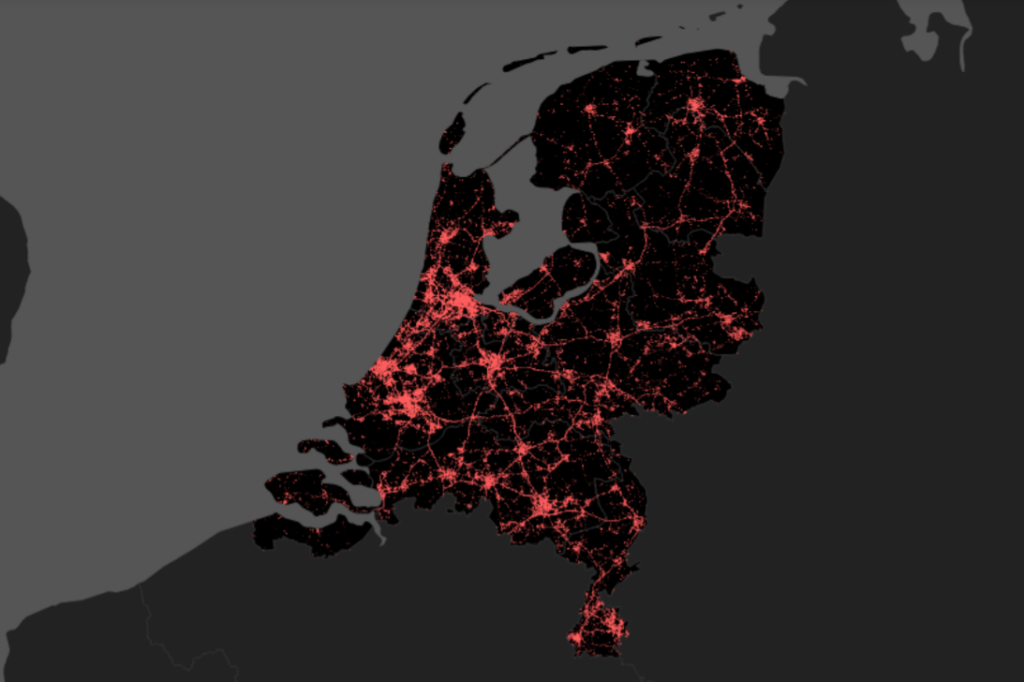BNR received more than 80 gigabytes of location data from data traders: the coordinates of millions of telephones, often registered dozens of times a day.
The gigantic mountain of data also includes movements of people with functions in which safety plays an important role. A senior army officer could be followed as he drove from his home in the Randstad to various military locations in the country. A destination he often visited was the Frederikazerne, headquarters of the Military Intelligence and Security Service (MIVD). The soldier confirmed the authenticity of the data to BNR by telephone.
[…]
The data also reveals the home address of someone who often visits the Penitentiary in Vught, where terrorists and serious criminals are imprisoned. A spokesperson for the Judicial Institutions Agency (DJI) confirmed that the person, who according to the Land Registry lives at this address, had actually brought a mobile phone onto the premises with permission and stated that the matter was being investigated.
These are just examples, the list of potential targets is long: up to 1,200 phones in the dataset visited the office in Zoetermeer where the National Police, National Public Prosecutor’s Office and Europol are located. Up to 70 telephones are registered in the King’s residential palace, Huis ten Bosch. At the Volkel Air Base, a storage point for nuclear weapons, up to 370 telephones were counted. The National Police’s management says it is aware of the problem and is ‘looking internally to see what measures are appropriate to combat this’.
‘National security implications’
BNR had two experts inspect the dataset. “This is an extreme security risk, with possible implications for national security,” says Ralph Moonen, technical director of Secura. “It’s really shocking that this can happen like this,” says Sjoerd van der Meulen, cybersecurity specialist at DataExpert.
The technology used to track mobile phones is designed for use by advertisers, but is suitable for other purposes, says Paul Pols, former technical advisor to the Assessment Committee for the Use of Powers, which supervises the intelligence services. According to Pols, it is known that the MIVD and AIVD also purchase access to this type of data on the data market under the heading ‘open sources’. “What is striking about this case is that you can easily access large amounts of data from Dutch citizens,” said the cybersecurity expert.
For sale via an online marketplace in Berlin
That access was achieved through an online marketplace based in Berlin. On this platform, Datarade.ai, hundreds of companies offer personal data for sale. In addition to location data, medical information and credit scores are also available.
Following a tip from a data subject, BNR responded to an advertisement offering location data of Dutch users. A sales employee of the platform then contacted two medium-sized providers: Datastream Group from Florida in the US and Factori.ai from Singapore – both companies have fewer than 50 employees, according to their LinkedIn pages.
Datastream and Factori offer similar services: a subscription to the location data of mobile phones in the Netherlands is available for prices starting from $2,000 per month. Those who pay more can receive fresh data every 24 hours via the cloud, possibly even from all over the world.
[…]
Upon request, BNR was therefore sent a full month of historical data from Dutch telephones. This data was anonymized – it did not contain telephone numbers. Individual phones can be recognized by unique number combinations, a ‘mobile advertising ID’ used by Apple and Google to show individual users relevant advertisements within the limits of European privacy legislation.
Possibly four million Dutch victims of tracking
The precise origin of the data traded online is unclear. According to the providers, these come from apps that have received permission from users to use location data. This includes fitness or navigation apps that sell data. This is how the data ultimately ends up at Factori and Datastream. By combining data from multiple sources, gigantic files are created.
[…]
it is not difficult to recognize the owners of individual phones in the data. By linking sleeping places to data from public registers, such as the Land Registry, and workplaces to LinkedIn profiles, BNR was able to identify, in addition to the army officer, a project manager from Alphen aan den Rijn and an amateur football referee. The discovery that he had been digitally stalked for at least a month led to shocked reactions. ‘Bizarre’, and: ‘I immediately turned off ‘sharing location data’ on my phone’.
Trade is prohibited, but the government does not act
Datarade, the Berlin data marketplace, informed BNR in an email that traders on their platform are ‘fully liable’ for the data they offer. Illegal practices can be reported using an online form. The spokesperson for the German company leaves open the question of whether measures are being taken against the sale of location data.
[…]
Source (Google Translate): Dutch phones can be secretly tracked online: ‘Extreme security risk’ | BNR News Radio
Source (Dutch original): Nederlandse telefoons online stiekem te volgen: ‘Extreem veiligheidsrisico’

Robin Edgar
Organisational Structures | Technology and Science | Military, IT and Lifestyle consultancy | Social, Broadcast & Cross Media | Flying aircraft

